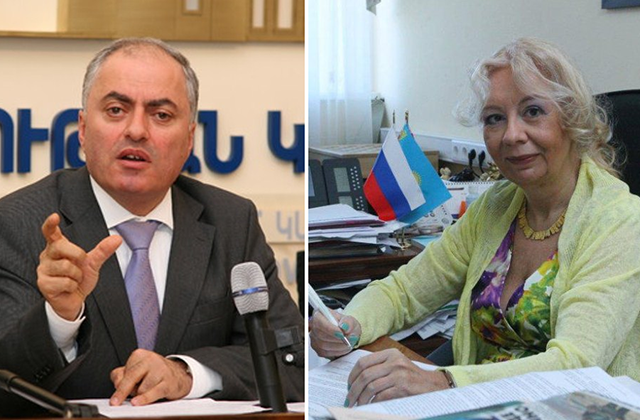Did Armenia’s authorities remember its interest?

Singling out last week’s most discussed economic topics, issue of petrol price will appear on the first place, together with remarks by Artak Shaboyan, head of State Commission for the Protection of the Economic Competition (SCPEC). If singled out by significance, the first place may be granted to RA Ministry of Finance on its reflection to Eurasian Economic Union (EEU). Surely, it refers the charged 20% VAT for vehicles imported from EEU.
It’s worth reminding the matter first, then clarifying why the issue is of such a crucial importance.
Tatyana Valovaya, Minister for Development and Integration of Microeconomics of Eurasian Economic Commission, announced on February 9, that charging of 20% VAT from physical persons, importing vehicles to Armenia from EEU member countries by Armenia’s authorities, contradicts legal-contractual framework of the Union. “De jure non-tariff barriers inside EEU are absent. The agreement clearly reads that the Union member countries aren’t entitled to apply non-tariff protection methods on one another. At the same time, very often we reveal likewise barriers. This is a result of either non-performance of decisions by the states or non-lucidity of law enforcement practice in our country.”
Then her say was more precise: “let me bring an example of non-tariff barrier, which is clearly banned by legislation—imposing VAT upon physical persons in importing vehicles. Such a barrier existed in Kazakhstan, which was eliminated. However, likewise barrier emerged in Armenia as well.”
Simply said, the EEU official was blaming Armenia’s authorities in illegal levying of rather serious fees from its own citizens. This was quite a serious imputation, which needed a response. However, for more than a week reporters failed to have any comment from Armenian competent bodies. In private talks one office of economy bloc was directing to the other, hinting that the issue isn’t within their scope of jurisdiction. It was worth considering, that either Armenia’s authorities don’t enjoy EEU “game rules”, or the imputation is grounded, and no one has the desire to endure ungrateful brunt of justification.
Finally, RA Ministry of Finance was the one to undertake it. However, to surprise of the many, this wasn’t a burden, just a contrary. Armen Alaverdayn, Deputy Minister of Finance, responded to the scandalous statement by Valovaya during the “Interview” (Hartsazruyts) program of Public Television of Armenia on February 17. Moreover, it was rather rough.
Armen Alaverdyan officially stated, that Armenia didn’t record any deviation or shortcoming regarding that issue, everything was done out of state budget interests and pursuant legislation.
“By transitional provisions we have that right and we’ll maintain it. This is one of our crucial income articles, and if we look through EEU legislation, the Republic of Armenia didn’t violate any regulations,” he said. Then he clarified, that on tax entries paid for vehicle import, last year Armenia had a loss of more than AMD 20 billion, as some vehicles have been imported not from third countries, but from Russia, “While importing goods to Armenia from EEU member countries, import duties aren’t charged, only VAT is. With a difference, if imported from Germany, the fee is charged within 10 days, and if imported from Russia, the fee should be paid until the date of 20th of the next month, including VAT.”
Surely, for a simple citizen, who imported a car from Russia or will import, this wasn’t a pleasant response. However, if we ignore personal interest and consider the issue not on a social and economic platform, but on a political one, everything is differently observed. Basically, the Republic of Armenia (represented by Ministry of Finance) through a rather transparent text said to Russia (EEU) that, first and foremost, it highlights its own interests. Of course, for any sovereign country this is a normal phenomenon, but in case of Armenia this was quite unexpected. Maybe it’s somehow conditioned exactly by Valovaya’s, putting it mildly, non-diplomatic, strong formulations. However, in any case, opposing to Russia in any issue (unfortunately) is perceived as unprecedented manifestation of bravery.
It’s not excluded, if A.Alaverdyan wasn’t strained by some circumstances and had the chance of expressing himself more freely, possibly he would openly enumerate losses Armenia suffered after engagement with EEU.
No less attractive is the fact, that 2 days before this interview—on February 15, within formation of a new legal ground between Armenia-EU ties, the first round of negotiations on Armenia-EU framework agreement on trade and investments was launched in Brussels. These negotiations with Europe are held around formerly clarified fields and directions, particularly, trade of goods and service, trade protection means, technical hindrances of trade, sanitary and phytosanitary measures, protection of intellectual property rights, competition, state purchases, stabile development, transparency, current payments and flow of capital, investment cooperation and their protection, settlement of disputes and etc.
Successful completion of negotiations means a new, higher level of Armenia-EU economic ties. Speaking of this, it’s noteworthy, that enthusiasm of opposition economists in no way yields Armenia’s officials.
To conclude, on the one hand, the Republic of Armenia “shows teeth” to EEU, implying that it’s not so contented with membership implications and will take steps to decrease losses. On the other hand, it tries even partially to restore the perspective for economic relations with the EU, which we had 3 September 2013.
To say, that little by little Armenia abandons EEU and turns its face to the European Union, will be an exaggeration though. However, the fact that we started to look to Europe over the shoulder, is already vivid. And how this exchange of quick glances will develop and what implications it’ll have, depends on the EEU’s jealousy degree.
By Babken Tunyan

























